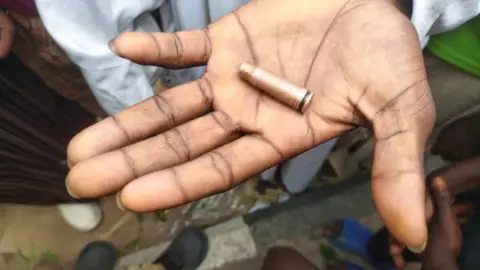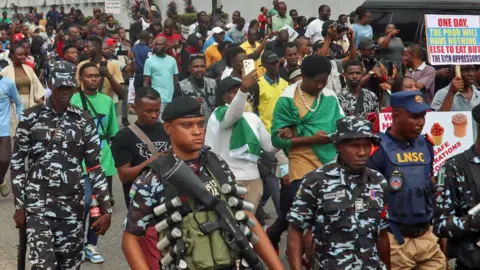A curfew has been enacted in Kano, Nigeria’s second-largest state, following protests against the rising cost of living that were overtaken by criminals who engaged in extensive looting and property damage, according to the governor’s office.
Kano experienced the largest demonstrations on the initial day of nationwide protests, leading to the closure of many businesses.
In cities across the country, protesters took to the streets, chanting phrases like “We are hungry.”
In response, police deployed live ammunition, tear gas, and hot water to disperse the crowds in Kano city, resulting in four individuals being injured and hospitalized.
Earlier, protesters had burned tires to create a bonfire outside the residence of state governor Abba Kabir Yusuf.
Additionally, looters raided a nearby warehouse, with people seen removing large cartons of cooking oil and mattresses.

The curfew effectively prevents further protests, mandating that all residents stay at home.
According to the last census conducted in 2006, Kano state’s population was recorded at 9.4 million, though unofficial estimates now suggest it has grown to approximately 20 million.
The 10-day protests, organized through social media, were motivated by the recent success of Kenyan demonstrators who pressured the government into canceling proposed tax hikes.
Mr Yusuf’s spokesman said the protests were peaceful in Kano, but the governor was forced to declare a curfew to “restore order and ensure the safety of our communities” because of “rampant looting, destruction of property and violence” unleashed by “thugs”.
On Wednesday evening, a court directed that protesters in the capital, Abuja, must confine their activities to the National Stadium, situated on the edge of the city.
But after gathering at the stadium’s gate on Thursday morning, the demonstrators – who have also been shouting the refrain “End bad governance” – began heading into the city centre.
This led the police to deploy tear gas canisters in an attempt to halt the procession, which disrupted traffic.
Security forces were stationed at key locations throughout the capital, including areas where banks have shut down, as well as in neighboring towns.
In Lagos, Nigeria’s economic center, protesters chanted “ole,” meaning “thief” in Yoruba, targeting President Bola Tinubu and his administration.
Many are infuriated by President Tinubu’s decision to remove the fuel subsidy, which he announced with immediate effect during his inauguration in May 2023.
The move, intended to reduce government spending, caused a surge in fuel prices and triggered a rise in the cost of other goods.
“Top on our demand is the subsidy removal. The government should reverse that decision,” Abuja protester Abiodun Sanusi told the BBC.
They also want the government to carry out wide-ranging reforms to the country’s electoral system and the judiciary.
Simi Jolaoso / BBC
You can’t beat a baby and ask the baby not to cry”
Before this so-called “day of rage”, the government appealed to Nigerians not to take to the streets and give the president time for policies to bear fruit.
But Lagos protester Kingsley Uadiale dismissed this saying, “Hunger is the reason why we’re all here. You can’t beat a baby and ask the baby not to cry.”
If the Tinubu administration wanted patience then, he said, they should lead by example.
“You can’t tell us to be patient and you’re acquiring a private jet,” he said, citing plans to buy new planes worth millions of dollars for Mr Tinubu and his deputy Kashim Shettima.
Dabiraoluwa Adeyinka, an activist also protesting in Lagos, said the aim of the demonstration was to get the price hikes on essential commodities reversed.
“If they don’t yield, we will continue to protest,” she told the BBC



